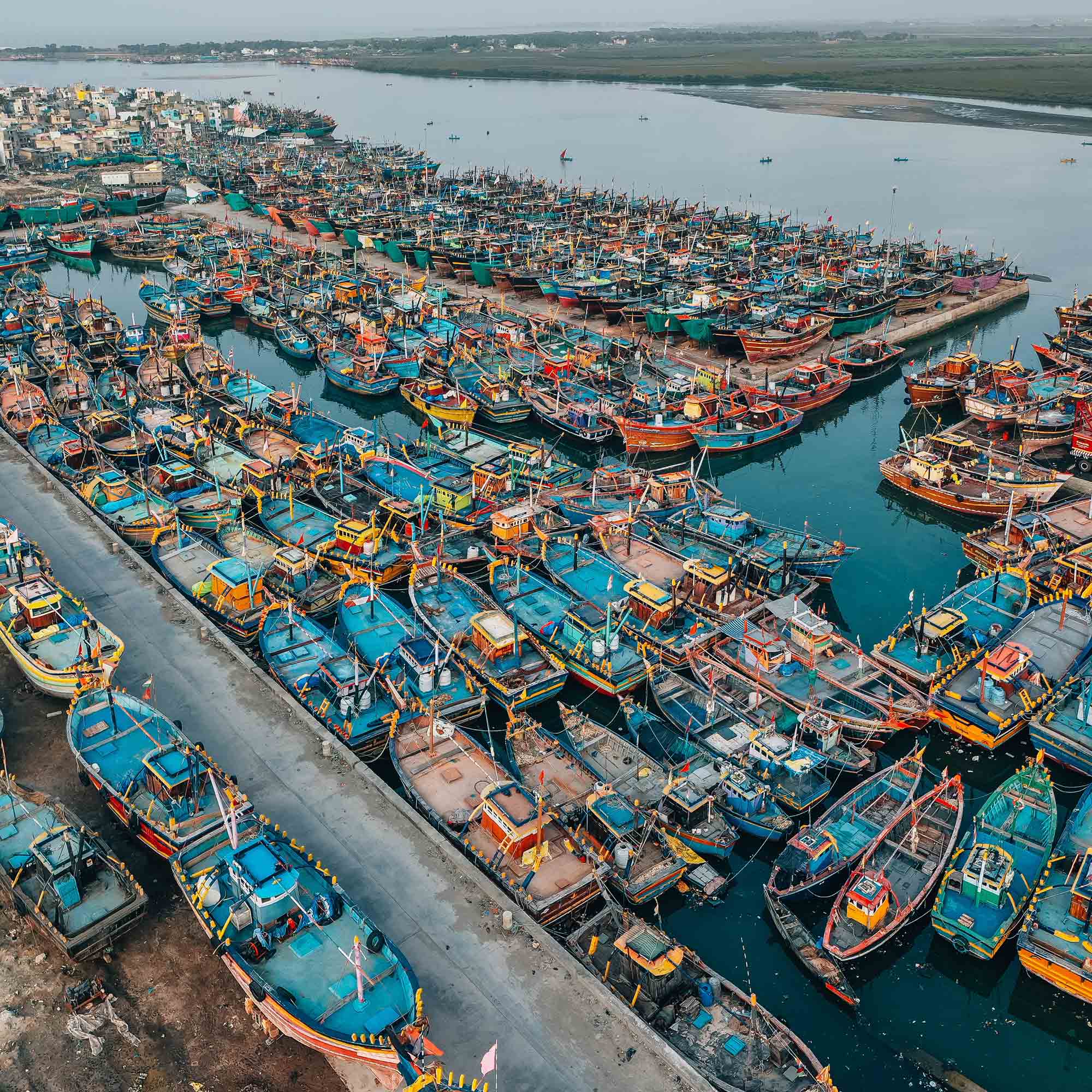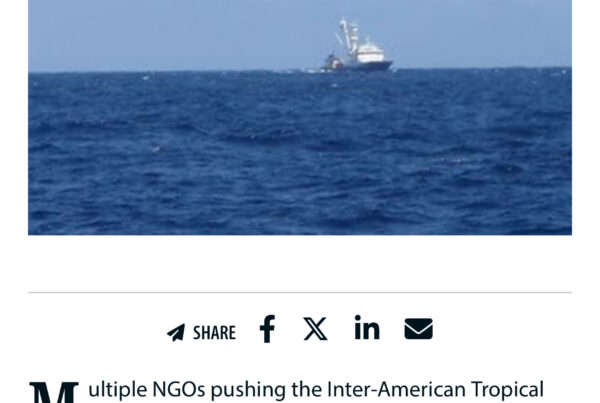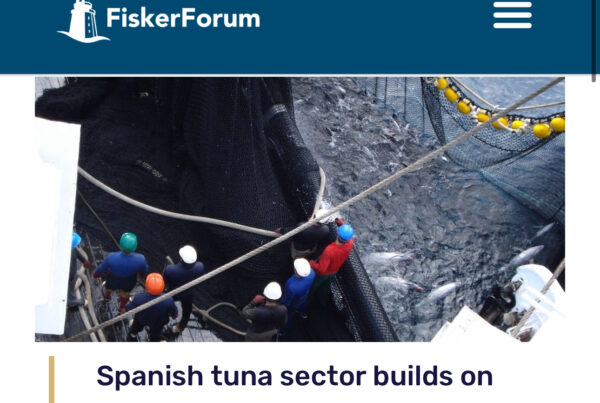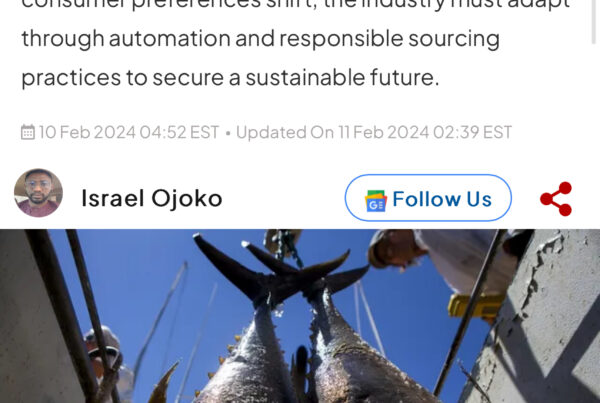ISSF Reports Finds That 85% of Global Tuna Catch Comes From Healthy Stocks
Of the total commercial tuna catch worldwide, 85% is sourced from stocks at “healthy” levels of abundance, according to the newest International Seafood Sustainability Foundation (ISSF) Status of the Stocks report. In addition, 11% of the total tuna catch came from overfished stocks, and 4% came from stocks at an intermediate level of abundance.
Several tuna stocks are considered overfished and/or subject to overfishing:
- Mediterranean albacore, Indian ocean bigeye and Indian Ocean yellowfin stocks are overfished and subject to overfishing.
- Pacific Ocean bluefin is overfished.
Continue reading here (Source: International Seafood Sustainability Foundation).
PNA Starts MSC Recertification Process; Papua New Guinea Tuna Seiners Awarded FISH Certification
The Parties to the Nauru Agreement (PNA) has announced it started the process of Marine Stewardship Council recertification for its purse-seine fishery. It will be assessed against the new MSC standard. The recertification effort will include free-school and fish-aggregating device (FAD)-caught skipjack, yellowfin, and bigeye, according to the PNA.
“The outcome of the last year’s attempt to get a scope extension for bigeye and FADs was disappointing, but it only strengthened the determination of our region to prove that our fishery is fully sustainable, and it encouraged the Pacific nations to not give up on its position. At Pacifical we are confident this process is on track to result in a positive outcome,” the PNA said in a press release. Continue reading here (Source: SeafoodSource).
United States Announced $800 Million in International Commitments for Protecting Our Ocean
At the Our Ocean Conference (OOC) in Panama, the United States highlighted new and recently launched global initiatives totaling more than USD 800 million to protect our ocean and assist developing countries – from supporting the creation of marine protected areas and helping partner countries secure and enforce their marine resources, to improving the resilience of coastal areas to climate change.
These announcements include both official conference pledges as well as initiatives announced on the margins of OOC. Continue reading here (Source: US Department of State).
Reefer Carrier, M/V Sunflower 7, Refused Port Access in Thialand for Unlicensed Fishing Involvement
Reefer vessel Sunflower 7, with 4000 tonnes of frozen tuna on board, has been turned away by the authorities when docking in Thailand to discharge its catch. Sunflower 7 has been identified as having deployed FADs for fishing vessels, initially in Kiribati waters, and therefore participating in fishing – for which a carrier vessel is not licensed.
Analysts checking the tracks of carrier vessels noticed patterns that looked unusual, and compared these to other carrier vessels tracks, before checking with skippers and getting the feedback that this looked like FAD setting behaviour. This was followed with a new algorithm being developed as part of the tracking system that flags up this type of behaviour.
While a carrier vessel can deliver FADs along with other supplies to fishing vessels, setting these FADs is considered to be a part of fishing operations, and contravenes the WCPFC convention. Continue reading here (Source: Fisker Forum).
SPC Scheme Will Help Nations Cope With Loss of Tuna Stocks
Efforts are being made to ensure Pacific nations can cope with changing tuna migration patterns in the region.
Tuna migrations are already happening due to climate change and will become more pronounced over the next 30 to 40 years, bringing multi-million dollar impacts to Pacific economies.
The Pacific Community (SPC), through its Climate Science for Ensuring Pacific Tuna Access Programme, aims to arm nations with the resources to counter this. Continue reading here (Source: Radio New Zealand).
Western Pacific Scientists to Discuss Longline Fishery and Tuna Issues This Week
Scientific advisors to the Western Pacific Regional Fishery Management Council will meet March 14-16, 2023, to provide advice and comments on on protected species interactions with the commercial Hawai‘i deep-set and American Samoa longline fisheries, domestic and international fishing regulations, and other topics.
The Council’s Scientific and Statistical Committee (SSC) will convene in a hybrid format, with public attendance limited to remote participation via web conference. The full agenda, background documents and instructions for connecting to the meeting and providing oral public comments are available at www.wpcouncil.org/event/147th-scientific-and-statistical-committee-meeting.
Continue reading here (Source: Samoa News).
PNA Has Stated Its MSC Reassessment – FADs and Bigeye Included
The PNA has started the process of MSC recertification for the entire PNA purse seine fishery, which will now be assessed against the new MSC standard (V2.01). The reassessment includes Freeschool and FAD – skipjack, yellowfin and bigeye. The Announcement Comment Draft Report (ACDR) has been published last week in the MSC website. Our Pacifical team is happy to share this news with each one of you.
The outcome of the last year’s attempt to get a scope extension for bigeye and FADs was disappointing, but it only strengthened the determination of our region to prove that our fishery is fully sustainable, and it encouraged the Pacific nations to not give up on its position. At Pacifical we are confident this process is on track to result in a positive outcome. Continue reading here(Source: Pacifical Wild Tuna).
World’s Largest Tuna Company Leads Call for Restoration of Endangered Species
Thai Union Group PLC, one of the world’s leading seafood producers and one of the largest producers of shelf-stable tuna products, announced today its commitment to only source from vessels that are implementing best practices to protect ocean wildlife from bycatch. Thai Union’s action is based on research by Sustainable Fisheries Partnership (SFP) on the risks to sharks, seabirds, turtles and other marine wildlife in the fisheries that supply the company and an analysis by Key Traceability of Thai Union’s tuna fishery improvement projects and in the highest risk fisheries that were identified in the audit.
“Environmental organizations are pointing to the biodiversity and species loss crisis that the planet is facing. The report by SFP notes the significant loss of ETP species in the Western Central Pacific Ocean region,” noted Adam Brennan, group director, sustainability at Thai Union. “We want to do more to ensure that we are sourcing from vessels that are doing everything they can to avoid and reduce bycatch.” Continue reading here (Source: PR Newswire).
New Report Highlights Fisheries By-Catch as the Main Threat to Whales and Dolphins in the Pacific Islands Region
A report released by the Secretariat of the Pacific Regional Environment Programme (SPREP) this week provides deeper insight on the status of cetaceans (whales and dolphins) in the waters surrounding the Pacific island countries and territories.
The Review of Cetacean Diversity, Status and Threats in the Pacific Islands region 2021 updates a 2008 review of the cetacean populations found in the region and the various threats to their existence. The review was undertaken by SPREP’s By-catch and Integrated Ecosystem Management (BIEM) Initiative aimed at improving conservation and sustainable management of marine biodiversity. The BIEM Initiative is a component of the Pacific-European Union Marine Partnership (PEUMP) Programme funded by the European Union and the Government of Sweden.
More than 30 different species of cetaceans are found in Pacific waters, from the large migratory blue whales and fin whales to small dolphins such as the Australian snubfin dolphin that lives in river deltas and estuaries. Continue reading here (Source: Newswires).



